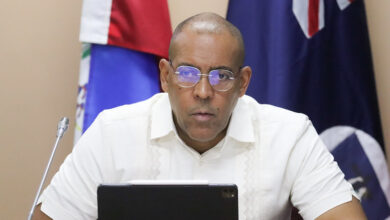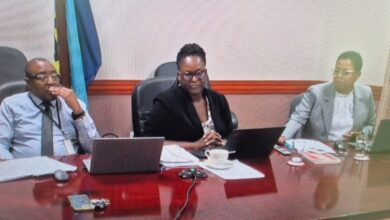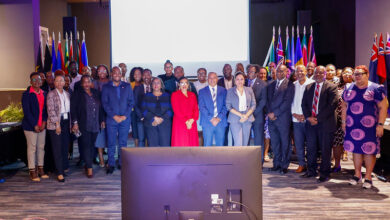(CARICOM Secretariat, Turkeyen, Greater Georgetown, Guyana) The Twenty-Fifth Special Meeting of the Council For Trade and Economic Development [Environment] (COTED) was held in Georgetown, Guyana, from 17-18 April 2008, under the Chairmanship of Guyana.
Ministers in attendance were the Hon. Harold Lovell, Minister of Tourism, Civil Aviation, Culture and the Environment, Antigua and Barbuda; the Hon. Esther Byer Suckoo, Minister of Family, Youth, Sports and the Environment, Barbados, the Hon, Elvin Penner, Minister of State, Ministry of Natural Resources and the Environment, Belize; Chair of the Meeting, the Hon. Robert Persaud, Minister of Agriculture, Republic of Guyana; Mr. Joseph Farrel, Minister, Ministry of Lands, Housing and the Environment, Montserrat, Sen. the Hon, Allen Chastanet, Minister, Ministry of Tourism and Civil Aviation; the Hon. Douglas Slater, Minister, Ministry of Health and the Environment, St. Vincent and the Grenadines; Sen. the Hon. Dr Emily Dick-Forde, Minister, Ministry of Planning, Housing and the Environment, Republic of Trinidad and Tobago.
The Commonwealth of the Bahamas was represented by Mr. Phillip Weech, Director General, Bahamas Environment, Science and Technology Commission.
OPENING SESSION
Dr. Edward Greene, Assistant Secretary General, Human and Social Development who chaired the Opening Ceremony referred to the intensive discussions at the preparatory meeting of officials and made the observation that a “three ones” principle — One policy framework, One management structure and One resource mobilization plan – is a prerequisite for a coordinated and relevant strategy for sustainable development. In addition, he stressed the need for a clearly defined information, education and communication strategy which recognizes the potency of the newer information and communications technologies and their reach to the wider communities of the region and the world.
Secretary-General of the Caribbean Community (CARICOM), H.E. Edwin Carrington said that the meeting was long overdue, particularly against the background of the environmental disasters in the Caribbean and other Regions of the world faced recently.
Secretary-General Carrington said he was happy that the COTED Meeting would deliberate on the development of a Caribbean Community Environment and Natural Resources Policy Framework and related issues such as climate change, disaster management, renewable energy, water resource management and the management of marine and food resources.
Pertinent to the COTED’s deliberations, the Secretary-General said, was the rapid increase of food prices, a challenge that was facing the entire world. He also said that the Community needed to take steps at the national and regional levels to improve education and awareness among the population so that they could better appreciate the linkages between the environment and the quality of life.
The Hon, Robert Persaud, Minister of Agriculture of Guyana, in his address pointed out that agriculture was the “chief victim” of the changing weather pattern. Bearing in mind the fact that the Region was witnessing more frequent and intense weather events which threatened the economies of the region, he recognized the need to build on and move forward expeditiously with the implementation of a Comprehensive Disaster Management Strategy.
In the context of the rising fuel prices and its implications for all sectors of the economy, the Minister also called for an increase in momentum towards renewable energy, building capacity for its management and opportunities for financing and access to technology. He also placed emphasis on the development of agro-energy in a manner that would not add to the Region’s environmental challenges nor jeopardize its food security.
The Hon, Allen Chastanet, Minister of Tourism and Civil Aviation, Saint Lucia, brought greetings on behalf of Hon Stephenson King Prime Minister of St Lucia who holds the portfolio for the Environment in the quasi Cabinet of the Community. He noted that climate change provided both opportunities and challenges for the Region. He noted the impact of current trends on Tourism and Agriculture in particular, stressed the importance of agro business for the Region and called for a more aggressive approach towards tackling environmental problems. Caribbean society, he added, needed to value the environment in which they lived and this had to “start at the school level”.
Minister Chastanet also called on Caribbean leaders to be more proactive in challenging global polices that adversely affected the well-being of the Region and pointed specifically to the carbon monoxide taxes on all flights leaving the UK. This, he said, was likely to have a disproportionate negative effect on tourism industry of the Region.
Implementation of the CSME: Environmental Dimensions
Due to the small size of CARICOM Member States, there is a strong interrelationship between the environment and the economy. As a result, there are intense pressures on the Region’s natural resources. Notwithstanding the increased attention given at the national level, environmental quality continues to decline. The meeting mandated the CARICOM Secretariat to mobilize the requisite resources for the development a Community Environment and Natural Resources Policy Framework.
The meeting also underscored that resolution of environmental issues are central to the effective functioning of the CSME, increased investment opportunities, economic growth and the competitiveness of the Region.
With regard to Environmental Statistics in CARICOM, the Meeting noted that the systematic collection of environmental data continued to present significant challenges for CARICOM Member States since only a few countries had established the capacity to generate, analyse and report on such statistics on a regular basis.
The meeting mandated the Secretariat, to consult with the relevant national and regional agencies to ascertain resource requirements and recommend priorities for capacity building to correct this deficiency and report to the next meeting of the Council.
WATER RESOURCE MANAGEMENT
The Meeting recognized the ongoing efforts towards the development and/or strengthening of the national water policies, Integrated Water Resource Management (IWRM) Plans and Water Use Efficiency (WUE) Plans in the various Member States and urged Ministers responsible for Water, Environment, Tourism, Agriculture and Health in particular, to provide the highest level political support for the implementation of IWRM and related Plans.
The Meeting endorsed the formation of a consortium of CARICOM Institutions that include, inter alia, the CARICOM Secretariat, CARDI, CDERA, CEHI, CCCCC, CIMH and UWI, to assist Member States in coordinated consultation with national, regional and international partners in the formulation of IWRM and WUE.
The Meeting also called for the development of a Common Water Strategy and Plan.
DEVELOPMENT OF A FRAMEWORK FOR THE MANAGEMENT OF THE CARIBBEAN SEA
The Meeting acknowledged that the Work Programme of the Caribbean Sea Commission was endorsed by the Ministerial Council of the Association of Caribbean States (ACS), and that an Action Plan was being developed to implement the Programme. Member States were requested to provide support to the development of the Action Plan.
With regard to the development of the management framework, the Meeting recognised the work done by the Cropper Foundation on the Caribbean Sea Assessment, the Caribbean Regional Fisheries Mechanism and benefits anticipated from the recently approved Caribbean Large Marine Ecosystem Project. Member States were urged to continue the pursuit of initiatives for the management of their coastal zones and maritime areas and in collaboration with the International Maritime Organization (IMO) take the necessary measures to ensure that the MARPOL Convention, which deals with pollution by garbage from ships, enters into force as soon as possible.
RENEWABLE ENERGY
The Meeting acknowledged the progress made by the Caribbean Renewable Energy Development Programme (CREDP) in the development of capacity building on renewable energy in the Region and the CREDP project contribution to the Draft CARICOM Energy Policy.
The Meeting encourages Member States to communicate to UNDP their continued support of its work. The Meeting also urged the CARICOM Secretariat to make every effort to finalise arrangements with the European Commission to implement the European Commission Project on Capacity Support for the Sustainable Management of the Energy Resources of the Caribbean Region at the earliest opportunity, and for Member States to continue their ongoing efforts to reform the energy sector with a view to diversifying their sources of energy including the increased use of renewable energy resources.
DISASTER MANAGEMENT
The Meeting expressed support for the Enhanced Comprehensive Disaster Management Strategy (CDM) developed by the Caribbean Disaster Emergency Response Agency (CDERA) and the efforts to develop and finance a multi-year disaster risk reduction programme as the platform for addressing the special concerns of the Region and technical assistance for disaster management in the Region. The enhanced CDM Strategy was also acknowledged as the Region’s blueprint for disaster management programming.
CLIMATE CHANGE ISSUES
The Meeting acknowledged the recognition by the international community of the Caribbean Community Climate Change Centre as a Centre of Excellence.
The Meeting also considered the Draft Caribbean Regional Strategy on Climate Change and agreed that the final document should be informed by the requisite consultative process before its completion.
The Meeting acknowledged the significant contribution that the Region has made to the negotiating process for a post-2012 Kyoto climate change framework and called for a more cohesive and coherent regional approach to these negotiations through the establishment of a regional mechanism to address the development of the post-2012 Kyoto framework.
The Meeting noted the impact of climate change on vulnerable groups and communities, and recommended that preventive strategies and programmes should be geared towards reducing economic susceptibility especially for those living in fragile ecological areas as well as livelihood and household structures and social exclusion or marginalization of vulnerable groups, and recommended that research should be conducted in these areas.
SOCIAL ELEMENTS OF THE MAURITIUS STRATEGY
The COTED considered the critical role of the human and social elements in the achievement of Sustainable Development. Specific attention was focused on regional efforts undertaken within the Pan Caribbean Partnership against HIV/AIDS and the Caribbean Cooperation in Health Initiative (CCH III) to address HIV/AIDS and non-communicable chronic diseases, respectively.
In addition, the Meeting noted the likely exacerbation of existing vulnerabilities from the impact of climate change.
COTED also took note of the fact that the severity of climate change was directly related to social inequities and deprivation. Policies and programmes to address water security and food security were seen as fundamental to mitigate the social, economic and psychological effects of climate change on vulnerable groups and communities and emphasised the need to strengthen collaboration in these areas.
The COTED highlighted the importance of culture and appropriate skills development in empowering citizens to achieve sustainable livelihoods.
SUPPORT FOR INTERNATIONAL ENVIRONMENTAL OBLIGATIONS IN THE CARIBBEAN: THE CHEMICALS MEAs
The Meeting noted the many challenges involved in the environmentally sound management of the chemical multilateral environmental agreements (MEAs) which were common to the Region, and agreed to begin discussions on a regional mechanism that could support coordination of these issues in the Region. They also requested that the CARICOM Secretariat become fully engaged in supporting Member States in their negotiation of these Conventions and other related arrangements at the regional and international levels.
The Capacity Building Related to Multilateral Environmental Agreements (MEAs) in ACP Countries project
The Meeting supported the efforts by CARICOM Secretariat as the executing agency to strengthen the Region’s capacity for the implementation of MEAs through the `Capacity Building Related to Multilateral Environmental Agreements (MEA) in ACP Countries – The Caribbean Component’ project being financed by the European Commission and implemented by the UNEP. This project focuses attention on enhancing the capacity of the Caribbean countries to comply with the MEAs and related commitments.
INTERNATIONAL ENVIRONMENTAL GOVERNANCE
The Meeting noted the many complex issues surrounding the international debate on international environmental governance reform. They agreed that strengthened international institutions and processes for environmental governance needed to be built on strong national institutional structures that mainstream the environment into national decision-making processes and development policies, and that stable, adequate and predictable financial resources are also essential for effective IEG.
The Meeting mandated CARICOM Secretariat to continue discussions with Member States towards the finalisation of a common position on the major issues and options in the IEG reform debate.
FINANCING ENVIRONMENTAL MANAGEMENT IN THE CARIBBEAN
The Meeting urged Members of the Caribbean Constituency to avail themselves of all opportunities to become more familiar with the Global Environment Facility (GEF) mechanisms as well as project resources available under the Regional Allocation Framework (RAF).
The COTED recommended that projects be immediately formulated to make use of the remaining resources under the RAF as well as those resources under the other focal areas of the GEF.
The Meeting also recommended that CARICOM Secretariat could play a role in facilitating dialogue and decision-making among Member States on the way forward with the GEF.
Governance
The Meeting agreed that there was the need to establish a governance arrangement for sustainable development with special reference to environment issues. In this regard, it approved the establishment of a technical group to examine the options for the development of a cohesive approach to the inter-sectoral and multifaceted elements of environment policies and programmes, the relationship between national and regional policies, and roles of the regional institutions and development partners, and provide a report by 1 July 2008.
In addition, the meeting recommended that consideration be given to the functioning of the Regional Coordinating Mechanism as part of the CDCC process and the need for the establishment of a Bureau of the Ministers of the Environment and the holding of Joint Meetings of the Council for Trade and Economic Development and the Council for Human and Social Development on the Environment.





